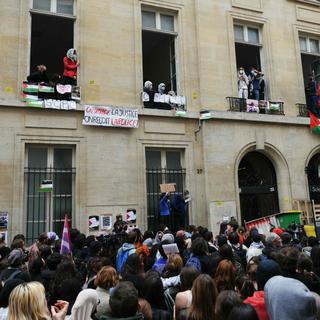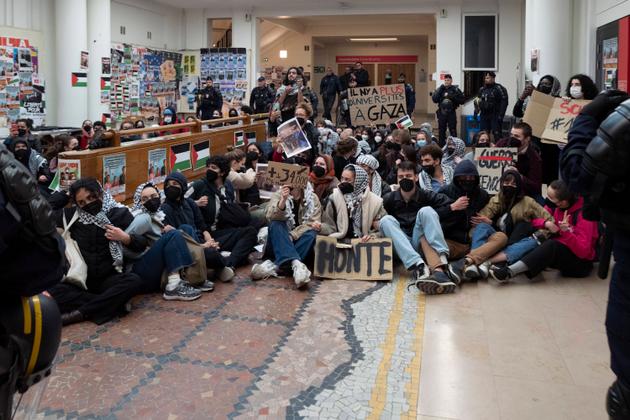


Gaza protests: The 60 days a Paris university was at the heart of the national political debate
Long ReadSit-ins, blockades, tension and discussions. The Paris university has been the focal point of a student movement calling for an end to the war in Gaza.
On the night of Thursday, May 2, Hicham* leaned out of one of the windows on the second floor of a building of the Sciences Po campus in Paris. Downstairs, a group stuck posters between the tall black railings, which read: "Anti-Semitism doesn't help the Palestinian cause." "Do you condemn Hamas?" Samuel Lejoyeux, president of the Union of French Jewish Students (UEJF), asked him from the sidewalk. From up high, the young man from the Palestine Committee expressed his approval. Then fired back: "Do you condemn the Israeli bombardments in Gaza?" The dialogue was short-lived.
A group of around 100 students spent the night in the school to draw attention to what they call a "genocide" in Gaza, with the intervention of the Israeli army in response to the Hamas attack on October 7, 2023. Among them, Hicham, Aïcha, Zineb, James and Louise (the last three have had their first names changed) call themselves atheists, Muslims and Jews, racialized or not, without a leader. By day, they wear masks, fearful of being targeted in the media as "Hamas 'Islamo-leftists,'" said Aïcha, a 22-year-old law school student. These young people born between 2002 and 2005, their eyes fixed on Gaza stories on social media, snapshots of war that haunt them, had tears in their eyes: "We can't ignore this."
"Last warning, please leave the premises." The next day, riot police entered the Péniche, the historic Sciences Po hall, where some 50 students were still in a sit-in, holding a poster reading "The children of Gaza thank us." "I've seen your posters, I'm stepping on them," a police officer blurted out, pushing a student toward the exit. In the street, other students were scattered along the Boulevard Saint-Germain. "We've just been kicked out by the police, even though we weren't blocking the entrance or academic activities," said James, a second-year student with a black and white keffiyeh on his head. "We now realize Bassères [the school's provisional administrator] is not from Sciences Po, he's from the government!"

For the past 60 days, the prestigious school, a hotbed of activism, social science research and elite training, has been a political theater of blockades and emotional outbursts. Inside, students passionate about their cause are making an effort to engage in debate, in a mixture of misunderstandings, cross-accusations of anti-Semitism and Zionism, and disagreements over the university's role in the face of the world's upheavals.
Above all, these discussions have been consumed by the interplay of stakeholders, opinion-forming media, professional activists and campaigning politicians, who are hardening their positions in a school mourning the death of Omri Ram, a former Israeli student from the Menton campus in southeastern France, murdered by Hamas on October 7.
You have 87.98% of this article left to read. The rest is for subscribers only.
